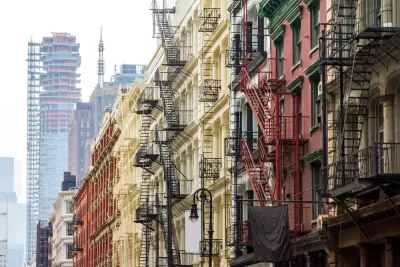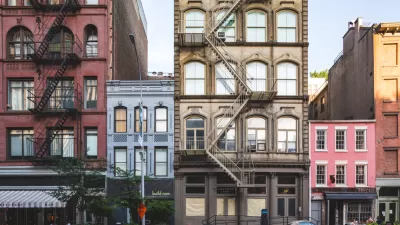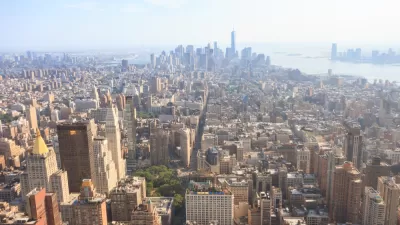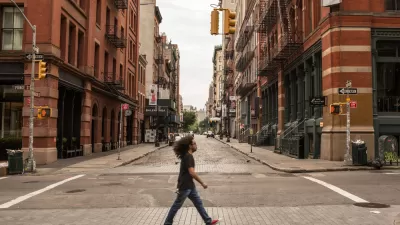The New York City Department of City Planning is expected, very soon, to release a rezoning proposal for the neighborhoods of SoHo and NoHo in New York City.

If the pro-housing development organization Open New York had its way, a draft rezoning of the neighborhoods of NoHo and SoHo in Manhattan would include a lot of new units, including many affordable units.
The New York City Department of City Planning is expected at any moment to release its draft rezoning of NoHo and SoHo, two of the "wealthiest and most desirable neighborhoods" in New York.
Open New York is preceding the expected release to make a modest proposal:
We ask that policymakers allow contextual increases in residential density within the area’s historic districts, while also permitting denser construction in the surrounding areas. At minimum, these two proposals would allow 3,400 more homes than the status quo, with almost 700 offered at below-market rates. Half of those, in turn, would be offered first to local residents.
The Medium post laying out the case calls for these additional units as a benefit to equity and provides details on how and where the neighborhood can absorb new units. For instance, despite a wealthy and attractive core, the post points to "underdeveloped and unloved" edges of these two neighborhoods.
"On one block alone — bounded by Canal St., West Broadway, Grand St., and Thompson St. — a rezoning to allow a floor area ratio of 12 (or FAR, the standard measure of density — the multiple of the lot area that can be built as floor area) could make way for well over 600,000 square feet of housing, all while remaining below the density of the 16-story Holland Plaza Building, built in 1929–30, which sits on the other side of the park near the Holland Tunnel entrance," according to the post.
In other parts of the neighborhoods, Open New York suggests that historical context could be used to guide increases in allowable construction.
An op-ed published in May also makes the case for a progressive approach to reforming zoning in the neighborhoods.
FULL STORY: SoHo/NoHo: Zoning for a Housing Crisis

Planetizen Federal Action Tracker
A weekly monitor of how Trump’s orders and actions are impacting planners and planning in America.

Maui's Vacation Rental Debate Turns Ugly
Verbal attacks, misinformation campaigns and fistfights plague a high-stakes debate to convert thousands of vacation rentals into long-term housing.

San Francisco Suspends Traffic Calming Amidst Record Deaths
Citing “a challenging fiscal landscape,” the city will cease the program on the heels of 42 traffic deaths, including 24 pedestrians.

Amtrak Rolls Out New Orleans to Alabama “Mardi Gras” Train
The new service will operate morning and evening departures between Mobile and New Orleans.

The Subversive Car-Free Guide to Trump's Great American Road Trip
Car-free ways to access Chicagoland’s best tourist attractions.

San Antonio and Austin are Fusing Into one Massive Megaregion
The region spanning the two central Texas cities is growing fast, posing challenges for local infrastructure and water supplies.
Urban Design for Planners 1: Software Tools
This six-course series explores essential urban design concepts using open source software and equips planners with the tools they need to participate fully in the urban design process.
Planning for Universal Design
Learn the tools for implementing Universal Design in planning regulations.
Heyer Gruel & Associates PA
JM Goldson LLC
Custer County Colorado
City of Camden Redevelopment Agency
City of Astoria
Transportation Research & Education Center (TREC) at Portland State University
Jefferson Parish Government
Camden Redevelopment Agency
City of Claremont





























